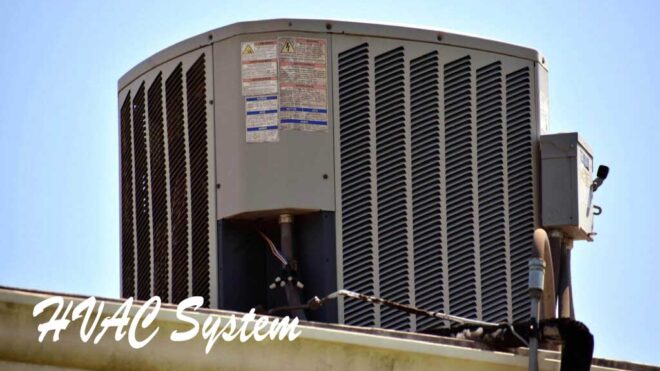How well do you know your HVAC system at home?
Surely you know HVAC stands for “heating, ventilation, and air conditioning.” It’s safe to assume that you know what your HVAC system does to make your home comfortable.
The question is, how well do you know the HVAC system and its processes? We don’t expect you to know everything that goes into your heating and cooling systems, but as one of the most important pieces of equipment you will ever have in your home, understanding how it works and knowing what you can do to make it work efficiently will go a long way.
As a homeowner, you may be limited to a few HVAC basics. You need the expertise of a professional technician for repair, replacement, and maintenance services, but a little homeowner’s knowledge is a huge advantage.
What does an HVAC system do?
The three interrelated functions of the HVAC systemㅡthat is, heating, ventilation, and air conditioningㅡallow you to control the temperature and the humidity level in your home. The brain of the HVAC system, the thermostat, will trigger other HVAC components so that your desired temperature and humidity level are met.
By filtering the air that re-circulates in your home, it also improves air quality. The HVAC system also acts as a defense system against harmful air pollutants that may cause airborne diseases.
How does an HVAC system work?
This is where many homeowners get it wrong: the HVAC system does not produce warm or cool air per se. In layman’s terms, the HVAC system moves air from its environments so that a set temperature is met.
In the height of summer, HVAC systems use their air conditioning part to transfer warm air outdoor and use a refrigerant that cools the indoor conditioned space. In the dead of winter, the HVAC systems use the furnace or a heat pump system to transfer heat to the air, which then circulates through the ductwork of a house and out of vents while gaseous by-products are released through exhaust outlets.
The HVAC ventilation cycle is responsible for moving the cool and warm air from the heating and cooling systems. Without a properly working ventilation system, both heating and cooling systems are seriously compromised and you will know the difference. Indoor air quality and comfort level will decline, especially if you live anywhere in Arizona.
Heating and cooling your home may sound simple enough, but they’re actually very complex processes of HVAC systems that need the help of several components, moving parts, and electrical energy. Most importantly, the HVAC system needs TLC, something only you and reliable HVAC experts, like our technicians at Air Care Cooling & Heating LLC, can provide.
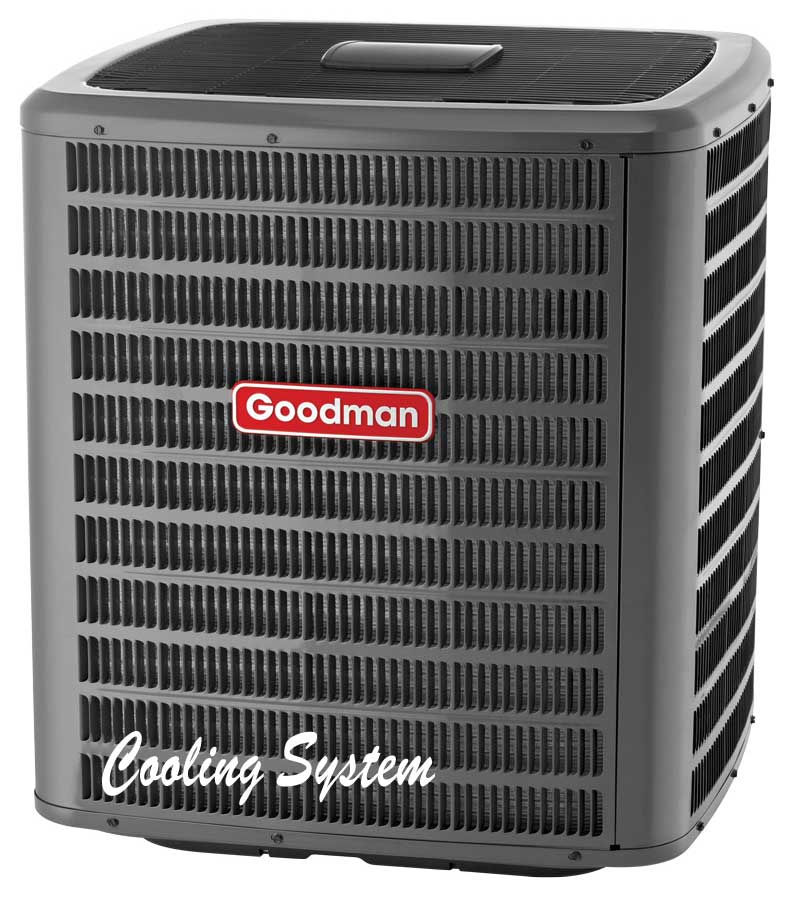
Cooling Systems
The air conditioning unit has three major parts: the compressor, the evaporator, and the condenser. Typically, the compressor and the condenser are parts of the outdoor unit while inside the house is where you will find the evaporator, inside the air handler.
Air conditioners use a refrigerant, a chemical that transforms from gas to liquid and back again as indoor heat is transferred outdoor, and cool air re-circulates throughout the ducts.
The cooling refrigerant reaches the compressor as gas. The compressor compresses this gas so that the molecules are squeezed tighter together and it becomes a high-pressure hot gas before it moves to the condensing unit.
It’s the condenser that removes the heat so that when the refrigerant leaves the condenser and reaches the evaporator coil, it is now a low-pressure, chilled gas. The air conditioning unit sucks air into the ducts through a vent. When this air moves over the cool refrigerant, heat is removed from the air and ducts then blow the cool air back into the house.
Heating Systems
The heating component of HVAC systems gives warmth to your home. There are different types of heating systems: the popular forced-air system, radiant heat systems, and geothermal heating systems.
A central heating system uses a central source of heat and ducts for heat distribution. The furnace is one such piece of equipment used in the heating system. The furnace is usually placed in the basement or garage. It has a burner, a blower, a heat exchanger, and a flue, which is basically an exhaust pipe for combustion by-products.
Heating systems run on gas or oil as fuel, but there are also or hybrid systems that use either.
Ventilation
Heat pumps, AC units, and even a simple furnace need the ventilating or ventilation system to complete their function. It’s the same for your home and your HVAC system.
Ventilation involves the exchange or replacement of air to achieve quality indoor air. It’s also responsible for oxygen replenishment and getting rid of moisture, smoke, odors, dust, airborne bacteria, and other air contaminants.
There are different types of ventilation systems, but you are most likely more familiar with natural ventilation. Natural ventilation is the uncontrolled or “natural” movement of air through gaps and small holes in a home. This allows fresh outdoor air to replace indoor air.
While outdoor air is ideal and has loads of benefits, natural ventilation is unpredictable, unreliable, and without adequate ability to control moisture. For your HVAC system, cracks and holes around the house are not helpful as they are exit points of conditioned air. That’s the HVAC basics of the work.
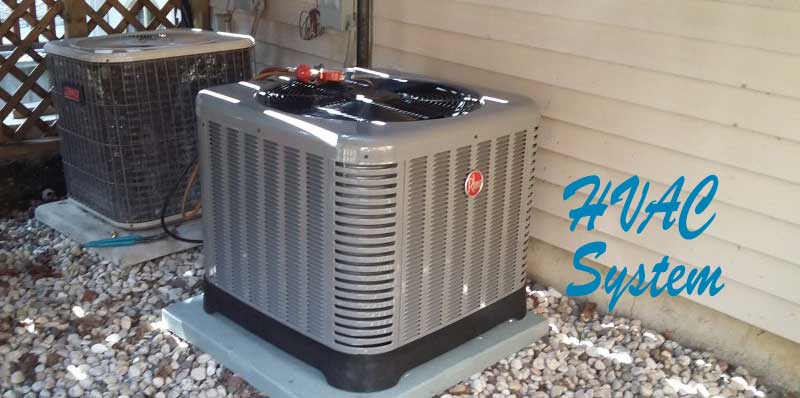
What are the different HVAC systems?
Split systems
There are split systems that use no ducts. They are referred to as mini-splits or ductless systems. These types of units mount directly on the wall or ceiling. The air intake, cooling fan, condensate drain, and drain pan are all within the wall mount unit.
In larger areas, the split system is preferred over mini split air conditioners. As the term implies, the split system splits the cold from the hot part of the system. The cold part inside an air handler includes the expansion valve and the cold coil. Air passes the coil and the cooled air then moves through the air ducts and comes out of the supply vents.
Packaged Heating and Air Conditioning System
Packaged AC units are great for residential homes as well as commercial or apartment buildings because of their ease of installation. They typically go right on the roof, while the units’ air return and AC exhaust outlets are all indoors.
All the important parts of packaged air conditioners, like the compressor, cooling coil, air handling unit, and air filter, are housed in a single casing assembled at the factory location. The packaged system is simply both parts of the split system put into one box.
There are two types of packaged AC systems. One has a water-cooled condenser and the other has air-cooled condensers.
Packaged AC system with water-cooled condenser
In water-cooled packaged air conditioner systems, water has to keep flowing in a shell-like container to keep the air conditioning system going. This type of AC produces less noise and operates even with low condensing temperatures. Its high rate of heat transfer makes it ideal in large-capacity plants.
On the flip side, because it uses water, it’s prone to corrosion and needs an additional water recirculation system.
Packaged AC system with air-cooled condenser
Air-cooled packaged ACs are smaller in size, simpler in operation. They need less maintenance and cost less compared with the water-cooled condenser. However, air-cooled condensers need more power to run and their cooling effect is not so high. As a result, air-cooled ACs are not ideal for long use.
Central AC System
In a central AC system, the air is cooled at a central location before it moves through the duct system to be distributed to and from different parts of the house. The work of the air conditioner compressor is what makes the whole process of air conditioning possible.
Aside from cooling your home, central air-conditioning systems also clean air around the house by drawing air out through return air ducts. An air filter is used to remove airborne particles before the air re-circulates back through the ducts.
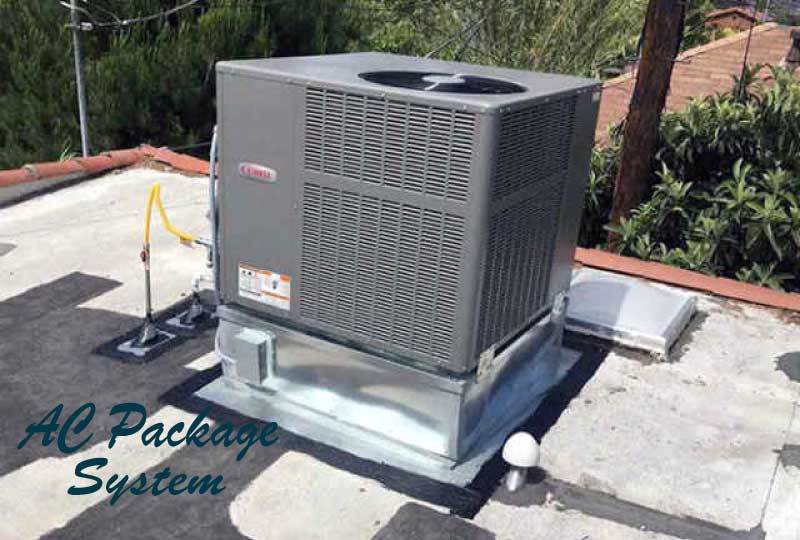
What’s the best HVAC system for your home?
Unless you’re building from the ground up, there’s probably an HVAC system sitting in your home. Whether it’s the best system for your needs is entirely a different matter. So how do you know what’s the best HVAC system for your home?
- Schedule an appointment with a reliable HVAC company for an assessment. The heating and cooling needs of a space change over time. A building extension, reconstruction, and even interior design affect heating and cooling loads of space. An HVAC expert can calculate heating and cooling loads and make professional recommendations to suit your present situation.
- Look for energy-efficient heating and air conditioning units. If you have an older model HVAC system that doesn’t have a SEER rating of 14, think about a possible upgrade. New air conditioning models come with modern conveniences and energy-efficient functions.
At Air Care Cooling & Heating LLC, we help clients make the best-educated decision by giving them our professional recommendations based on a site or home evaluation.
Seasonal Energy Efficiency Ratio (SEER) of HVAC systems
The Seasonal Energy Efficiency Ratio or SEER measures the cooling efficiency of an air conditioner or a heat pump by calculating the cooling output of a cooling season divided by the total electric energy input during the same time frame.
Nowadays, air conditioners have a minimum SEER rating is 13. ENERGY STAR® qualified air conditioners must have a minimum SEER rating of 14.5. The higher the SEER rating, the higher energy efficiency.
It’s important to note here that there are other important factors that also affect the efficiency of an HVAC system. Aside from the SEER rating, the size of your home, your duct system, your home insulation, and other variables must be considered as well.
If you want to schedule a home inspection, call us and one of our HVAC technicians will help you determine the best energy-efficient HVAC system for your home.
How to care for an HVAC system
Caring for your HVAC system does not have to be complicated. In fact, it’s better to leave the complicated stuff to HVAC experts. But don’t be quick to forget about your unit either. There are many things you can do to make a difference.
Here are three tips you should do on a regular basis to ensure your heating, ventilation, and air conditioning system stays in good condition:
- Clean filters at least once a month to remove buildup and replace disposable ones every 3 months or so. This tip also includes cleaning the air return.
- Clean the area around the outdoor unit. The outdoor unit is exposed to harsh elements such as water, wind, heat, rain, and snow. Leaves, branches, and other vegetation can also clog the outdoor unit and prevent it from functioning properly.
- Give your heating, ventilation, and air conditioning system much-needed professional maintenance service. Scheduled maintenance services with a pro twice a year, one before the summer kicks in and another before the start of winter.
Why is heating and cooling maintenance important?
HVAC services such as repair, replacement, and maintenance keep your HVAC systems in good condition and improve air quality in your home.
AC units need routine maintenance at least once a year before the start of summer. If your type of system is a heat pump, your heating and cooling unit has to be serviced in the spring and in the fall or before winter and summer kick in.
Many homeowners find HVAC maintenance costly and unnecessary. They couldn’t be farther from fact. The fact is, all HVAC systems, even the most expensive ones, need TLC because, the moment you start using your HVAC equipment, it’s subjected to normal wear and tear.
Preventive maintenance keeps your equipment running, prevents frequent repairs and costly replacements, and extends the life of the equipment. Pre-season maintenance ensures your unit is ready for the demands of the season, may that be excessive heat or too much cold.
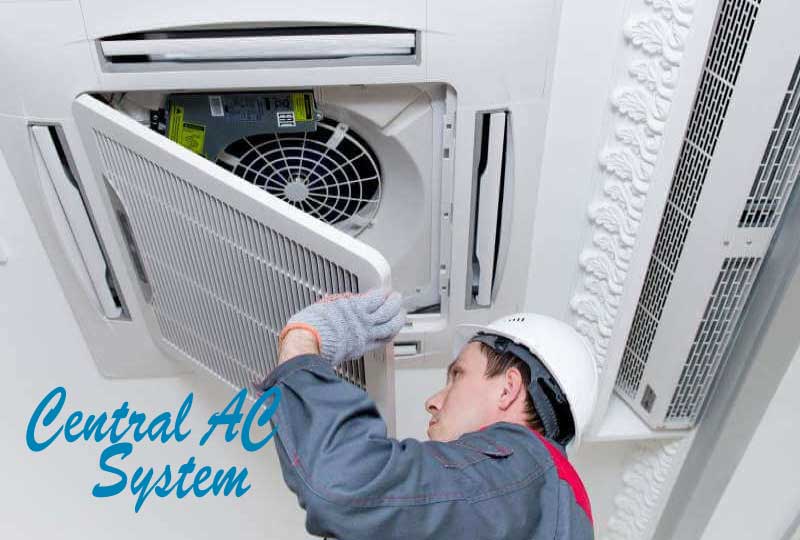
What are the common HVAC problems?
When it comes to HVAC systems, an ounce of prevention is worth a pound of cure. As a homeowner, you always want to stay ahead of the game and recognize HVAC issues for what they are before they become full-blown HVAC disasters.
Here are some common HVAC concerns that you should watch out for.
Clogged filters
Dirty filters restrict airflow, driving your HVAC unit to work harder to circulate air through the ducts. Insufficient air does not only put a strain on the entire HVAC system, but it is also a major inconvenience on your part. Without proper airflow, the set temperature will not be met and the comfort level will go down.
Thermostat malfunction
There are many different types of thermostats. Some are smart and programmable while others are not. All thermostats, however, kick the HVAC system into action. So when the thermostat stops working properly, it affects other HVAC components of the heat pump, furnace, or AC, which will, ultimately, affect the temperature and air quality of a given space.
Leaking duct system
When ducts leak, you lose conditioned air, which will eventually affect the comfort level in your home. Worse, the ducts suck in dirty, unfiltered air from the attic or the basement. That means air contaminants will circulate in the air you breathe.
Conventional duct-sealing methods include sealing from the exterior using duct tape or mastic. While that’s always an option, at Air Care Cooling & Heating LLC, we provide an even better solution using a modern interior duct-sealing method. It is proven and tested more efficient and cost-effective. Call us and speak to one of our technicians about interior duct sealing.
Frozen evaporator coil
A frozen evaporator coil is a common AC problem. It may be caused by dirty filters, broken fans, blocked condensate lines, malfunctioning thermostats, and low refrigerant levels. The refrigerant cannot absorb heat when the coils are frozen and this will lead to a reduced cooling effect.
How can you tell the coils have frozen over if you can’t see ice, right? One tip is to check for puddles of water near the blower. Another is to call an HVAC professional ASAP.
Understanding how your air conditioner, furnace, or heat pump works will help you appreciate its value as an essential part of your home. Find an HVAC contractor who will care for your unit now.

